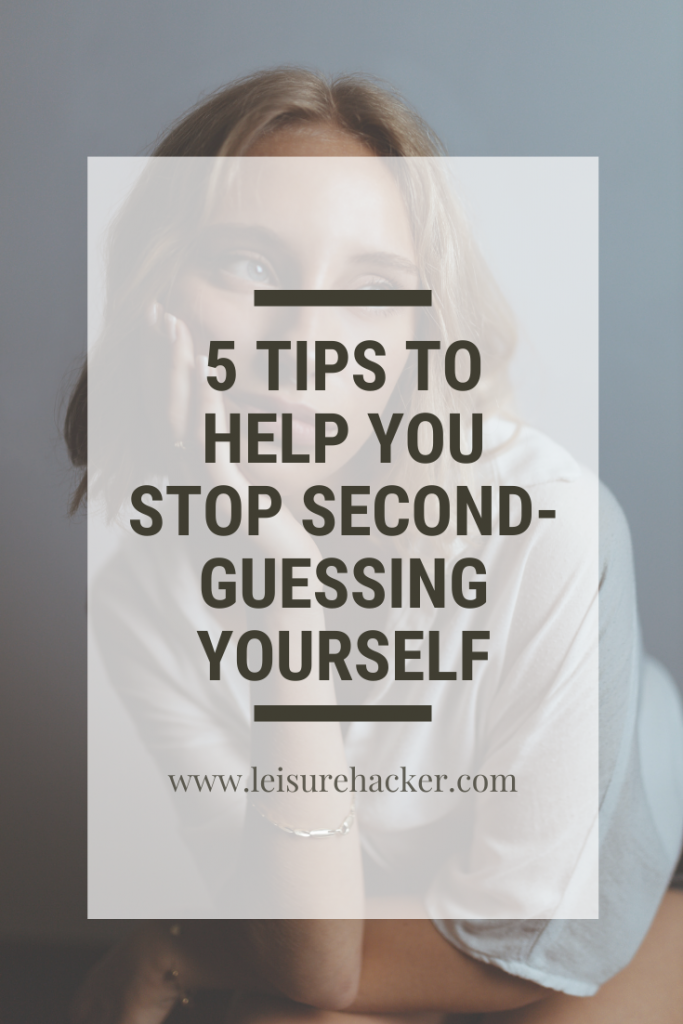5 tips to help you stop second-guessing yourself in business

March 21, 2021
You’re a badass when it comes to client work, but when you need to decide something for your own business you keep second-guessing yourself and wasting so much time and at the end of the day nothing gets ACTUALLY done? I get it – making decisions as a business owner can be hard and scary (and that’s ok – you can be really good at what you do, but nobody ever taught us HOW to be business owners)
So how can we stop second-guessing ourselves and constantly wondering, “am I doing this right?”

This is where Self-authorship comes into play.
Second-guessing is often caused by not trusting ourselves or not being confident enough. Building Self-authorship allows us to decrease the volume of external voices (hey social media and “shoulds”) and increase our internal voice by building core confidence. This allows us to make decisions with ease and stop wasting time in our heads.
Building self-authorship is a process, one that takes time and some work, but here are my top 5 tips to get you started in becoming a confidant decision making macheine:
1. Build an internal foundation
It’s easy to get caught up in the noise around us and be affected by what everyone else is doing/creating/thinking, especially if we don’t have a strong internal foundation. Create a CRYSTAL CLEAR vision for your life and your business, understand your core values, what you stand for and what you stand against. Now, every time you’ll need to make a decision, you can ask yourself – “is this aligned?” and let your internal foundation guide you.
2. Learn to trust your internal voice
Making decisions can force us to grow outside of our comfort zone. When we second-guess ourselves, it’s usually because of the discomfort this causes us.
We learn how to trust ourselves by having small mastery experiences along the way and building up belief in ourselves. Keep practicing tuning into your intuition and making decisions in smaller things, like what to have for launch or what to watch on Netflix (without browsing through your feed for an hour before). Making small decisions, day by day, until you build a strong connection to your voice. It’s like a muscle -the more you do it, the better you’ll get at it

3. Face the fear
When we need to make a decision, everything looks like a life or death one, but actually, all decisions can be modified if there’s an outcome you don’t like. Most of the time, it seems worse in our minds than it actually is, so I like to use something that I learned from Tim Ferriss called Fear-Setting.
Fear setting is a powerful reflection exercise used to help us see decisions more clearly when fear is holding us back and clouds our thinking – this is part one of the exercise.
So when facing a big decision, take a piece of paper and make three lists –
- Define – list your worst-case scenario. What might go wrong?
- Prevent – Now write down how can you prevent each thing from happening? What actions could you take to make those scenarios less likely?
- Repair – finally, If the worst happens, how can you fix it? What actions could you take to repair the damage or get yourself back on track?
Now try to assess the impact of these worst-case scenarios on a scale of 1-10. 1 – being a minimal impact on your life and 10 – permanently life-altering in a significant way. Most of the time, you’ll see that the “worst-case scenarios” actually aren’t that bad or are easily managed.
4. Embrace a growth mindset
Remind yourself there is no really a “right” or “wrong” decision to whatever you might be second-guessing.
As explained by Stanford psychologist Carol Dweck in “Mindset: The New Psychology of Success,” People who are fixated on doing and saying the right thing have a fixed mindset. When this is the case, they believe failure of any kind is a moral indictment as opposed to a learning situation to get better. We ALL can develop a growth mindset if we decide that mistakes are what allow our minds and abilities to get stronger, and in doing so, we become smarter, more successful, and more persistent.”
When we have a growth mindset, we appreciate the journey over the results because we understand It’s all about and part of the process. We also view challenges as opportunities and “failures” as a learning experience. When we look at decisions this way, it changes our perspective.
Related: Why failure may be the best thing that has happened to you since sliced bread

5. Practice self-compassion
We are always making the best decisions we have access to at the moment. Once we understand that this is a journey of growing, learning, and building self-trust, you’ll need to develop a more kind, loving approach to yourself.
As explain by Dr. Kristin Neff, “Self-compassionate people recognize that being imperfect, failing, and experiencing life difficulties is inevitable, so they tend to be gentle with themselves when confronted with painful experiences rather than getting angry when life falls short of set ideals.”
I highly recommend watching her talk about self-compassion.
We can always think of how things just don’t work out for us, but we can always look at how things DO work out for us (even when we don’t see it and that moment) and having trust in the process and ourselves.
As you can imagine, developing self-authorship isn’t an easy or quick fix but definitely possible – if you want to learn more on how to integrate this into your life and business, please schedule a completely free call with me to talk this further ,

Leave a Reply Cancel reply
GYST
*
My 3-step formula to increase productivity, reduce stress, and create more balance in a busy world.
*Get Your Sh*t Together:
A FREE Guide to Organizing Your Life
Get the free guide now!
From Task Overwhelm To Effortlessly Efficient
THE 5-DAY PRODUCTIVITY CHALLENGE TO ORGANIZE & PRIORITIZE YOUR TASKS
TELL ME MORE!
Say Goodbye to 'Task Chaos' and the feeling of never truly getting ahead, and say Hello to a more organized, focused, and accomplished you!